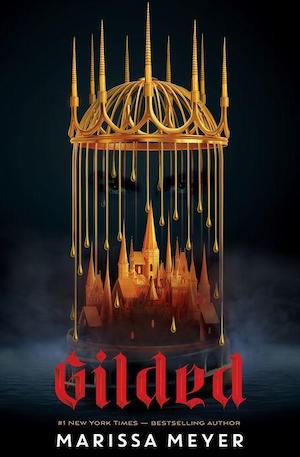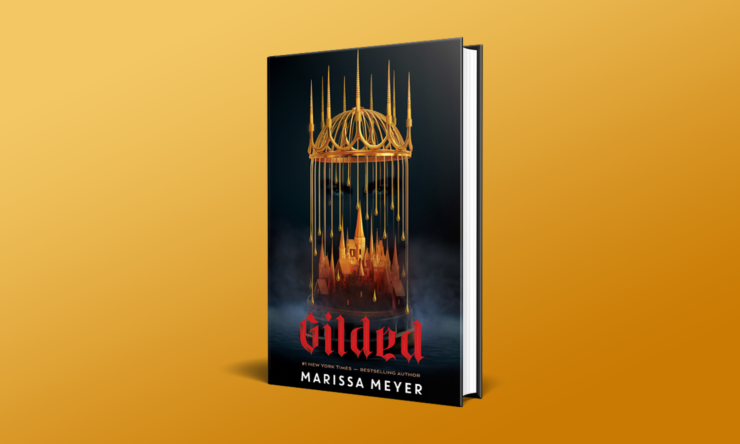If there’s anyone who is adept at spinning familiar fairy tales into radically new retellings, it’s Marissa Meyer. Best known for her Lunar Chronicles series, the bestselling author has turned Cinderella into a cyborg, trapped Rapunzel in a satellite, and cast a spell with a Moon-dwelling Wicked Queen.
Gilded, her new yarn about the mischievous Rumpelstiltskin, is being described as her return to fairy tales, yet simultaneously it feels like she never left. But just as with her magical contemporary romance Instant Karma, Gilded is something new for Meyer: pure fantasy shot through with chilling darkness, interrogating every angle of the Rumpelstiltskin source material with the endeavor of finding (or creating out of whole cloth) the two sides to the story.
In the original Brothers Grimm telling, the eponymous imp helps a poor miller’s daughter whose father has trapped her in the lie that she can spin straw into gold. For three nights, he saves her life by spinning gold for the king who would otherwise kill her if her deception were discovered; but whereas she can pay him with trinkets the first two nights, by the third she is empty-handed and so desperate that she promises her hypothetical firstborn child. When she eventually does give birth and tries to wriggle out of their pact, the only way the imp will release her is if she can speak his true name—which she does after eavesdropping on Rumpeltstiltskin singing about himself. Thwarted, the imp leaves the miller’s daughter-turned-queen, her king, and their child in peace.
In Gilded, Meyer centers the tale on eighteen-year-old Serilda, and makes you root for a liar: “blessed” by the trickster god Wyrdith with uncanny gold eyes, she is capable of spinning outlandish tales, which land great with the village children she tutors but makes Serilda seem untrustworthy to adults and downright cursed to her peers. Yet she delights in embellishment and how it brightens her humble life at her father’s mill following her mother’s abandonment of the family and Serilda’s own lack of marriage and employment prospects. What’s more, it’s her quick thinking on her feet that saves her when the fearsome Erlking—undead sovereign of the dark ones—descends upon her village for the dark realm’s monthly hunt.
Buy the Book


Gilded
Unfortunately, the problem with fantastical lies is how they draw attention, and the Erlking, normally dismissive of mortals, has special use for a gold-spinner. And so he whisks Serilda to his castle in the nearby town of Adalheid, pitting her against a dungeon full of straw and the truth that could kill her. But when a mysterious redheaded youth appears at her time of need, Serilda finds herself inexplicably drawn to the young man named Gild, who can save her life with his magic… for a price, of course.
Meyer smartly expands the original fairy tale by having it still take place over a handful of nights, except that each is separated by a month—the Hunger Moon, the Crow Moon, and so forth. This lunar worldbuilding realistically depicts the life cycle of a lie: Every month Serilda has the chance to confess her deceit, only to instead build upon the original falsehood until she has dug herself so deep into this previously thrilling story that it seems she will become a casualty of its telling.
Serilda’s compulsion to lie—equal parts divine gift and mortal foible—makes her an endearing narrator. Especially so in the sly reversals in which her monthly adventures grow more fantastical, and more true, yet no one will believe her; and as the lies she is forced to continue telling begin getting away from her, forcing her into specific paths and choices based on how she initially misrepresented herself. At the same time, her travels pull her away from her stagnant life at the mill and into the path of new friends and allies, from a kindly maternal innkeeper in Adalheid to the intriguingly touch-starved Gild.
The book also has a satisfyingly dark side to it, mimicking the veil between the Erlking’s world and Serilda’s—what starts out as a small tear to be passed through only on a given Moon, but which frays and expands with this gods-touched mortal’s movements back and forth. Just as she is exposed to the Gothic thrills of a long-dead castle, the Erlking’s threat reaches beyond just her, to the people she holds most dear. Meyer impressively commits to ghastly consequences for Serilda’s actions, in bleak callbacks to the truly grim origins of Jacob and Wilhelm’s recorded tales.
The story does occasionally spin away from Rumpelstiltskin, however. The archetypal character has long been presented as a cackling trickster, whereas sensitive, vulnerable Gild bears very little resemblance to his supposed namesake. By casting him and the Erlking as night-and-day allies and antagonists to Serilda, some gray-area nuance is lost, especially as readers begin to catch on to which plot beat Meyer has grasped next, to run through the figurative spinning wheel to fill the next narrative bobbin. Additionally, Meyer’s dialogue often lends itself more naturally to futuristic stories, in which language has evolved along with culture. Some of the phrasing or personality quirks that come out of the mouths of Serilda and others can come across as anachronistically self-aware for a fantasy setting, even one whose characters can speak their fates into existence through stories. (That said: Serilda using stories about nonbinary gods to teach the children that they can grow beyond their society’s gender roles, which relegate girls to the spinning wheel, fits wonderfully into this world.)
The book concludes in such an abrupt fashion that it is unclear if Meyer is setting up a potential sequel—there is certainly story left to be spun—or ending on the kind of cliffhanger that will invite readers, like Serilda’s eager audience, to fill in what they believe happens next. Despite a slow pace in parts, it’s an admirably fresh examination on the line between spinning a harmless fairy tale and unleashing the dark magic of a dangerous lie, worse than any curse, on the world.
Gilded is available from Feiwel & Friends.
Natalie Zutter is a playwright and pop culture critic based in Brooklyn. She talks about SFF books, movies, and TV on Twitter.










